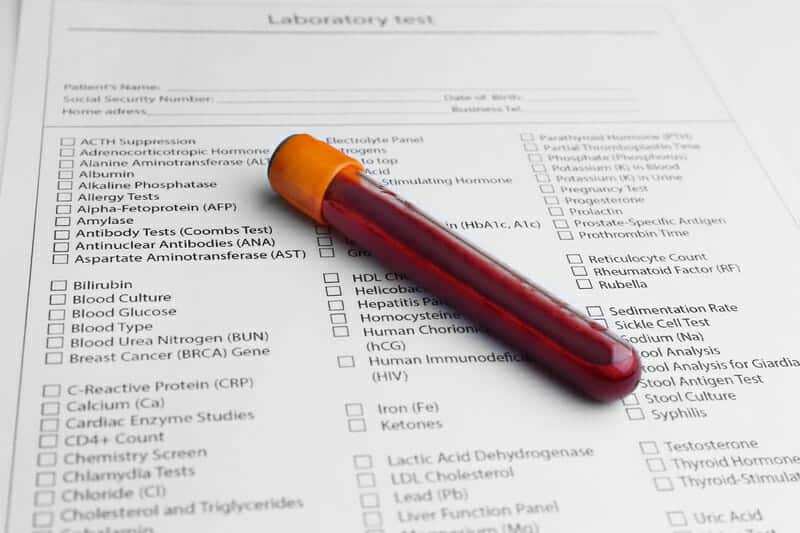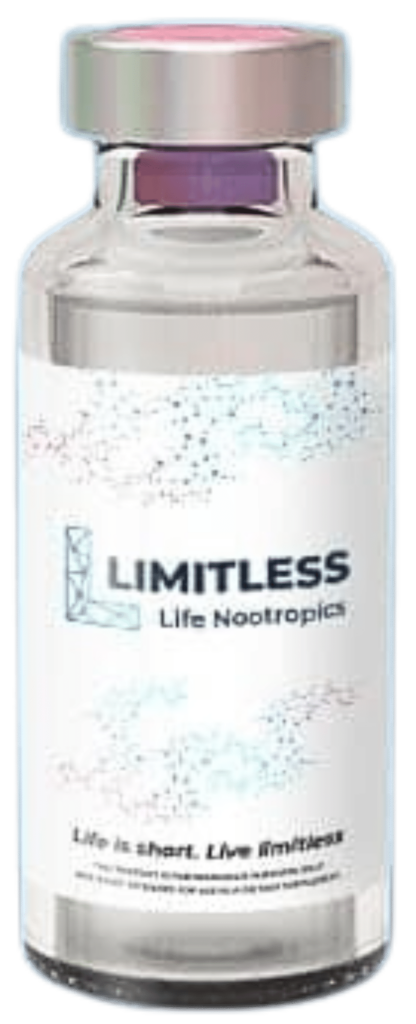Getting a blood test seems like something you should only do when you’re a middle-aged man or woman, or when the sh*t hits the fan.
But this could not be further from the truth, which is why the title of this article is a restatement of a very important point I made at the end of 2019.
Whether you are using therapeutic testosterone or not, EVERYONE reading this article should be doing regular blood work at least once a year.
According to Abbott Laboratories:
- 50% of the information in a typical medical chart comes from lab data
- 70% of medical decisions are informed by diagnostic test results, which includes blood tests
We’re going to cover how the *sick care* medical industry actively discourages you from getting your blood tested, why you’ll want to do it as the pandemic (hopefully) comes to a close, my #1 recommendation for a reliable blood lab clinic…
… and much more!
Table of Contents
ToggleWhy The Medical Industry DOES NOT Want You To Get Your Blood Work Done
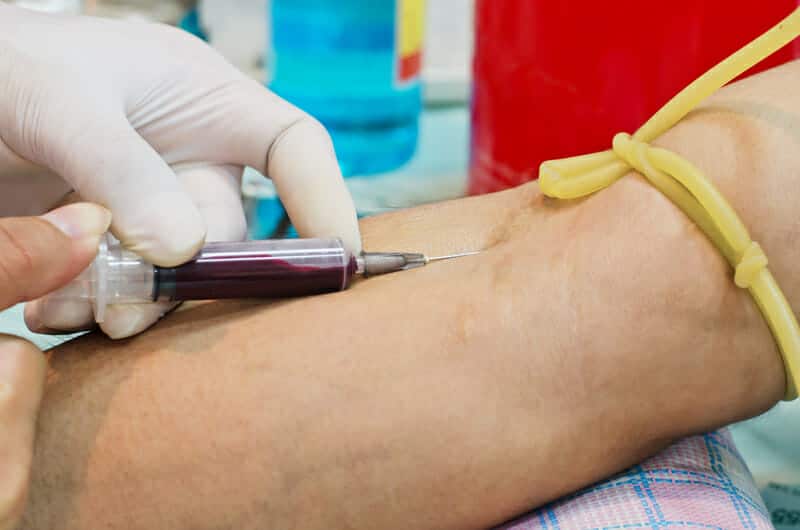
If a healthy man or woman goes to their general practitioner (GP) and asks for a blood test to assess their health, they will be met with a great deal of resistance.
This is not out of fear or accident — it is literally what you will find within their practicing guidelines:
“In 3–39% of the patients visiting a GP with complaints, the GP is unable to establish a diagnosis after taking their history and performing a physical examination. Such complaints are labelled ‘unexplained complaints’ within the definition of the Dutch College of General Practitioners
…Sometimes, however, they may be indicative of somatic or psychiatric pathology, or evolve into chronic forms of unexplained complaints, such as somatoform disorders.”
The paper I’m quoting was designed to examine the usefulness of blood tests in patients reporting “unexplainable fatigue”.
A very common symptom of chronically low testosterone levels in men.
Even in the introduction of the paper, the downsides of blood testing are emphasized:
“It has frequently been suggested that immediate test ordering in unexplained complaints is superfluous. As the prior probability of underlying somatic pathology may be expected to be less than 5% in unselected patients, the likelihood of false-positive test results is high.
Therefore, in its guideline on blood-test ordering, the Dutch College of General Practitioners recommends a 4-week postponement of blood-test ordering for patients with unexplained complaints. If blood tests are ordered, it recommends ordering a limited number of tests. This approach is expected to lower the number of tested patients and, consequently, the risk of false-positive test results”
Makes sense if you assume two things:
- The doctor you are seeing has no idea what he’s doing, especially around the topic of hormone optimization therapy
- You don’t know how to ask your doctor the right questions, what tests to ask for, how to properly get the right results, or why you’re asking for said tests.
In a qualitative study published in 2006 that examined patients’ expectations of their doctors to prescribe lab tests, you can clearly see how the healthcare industry condescendingly looks down on patients:
“Fifty-seven (26%) of the 224 respondents wanted blood tests. Twenty-two were interviewed. Patients overestimated the qualities of blood tests. Favourable test results were regarded as proof of good health.
Patients regarded blood tests as a useful instrument to screen for serious disorders, and were confirmed in this belief by people in their social environment and by the media. Many patients expected their GP to take an active test ordering approach, though some indicated that they might be convinced if their GP proposed a wait-and-see policy.”
The conclusion is equally appalling, as it implies the patient doesn’t deserve to know the truth about blood tests:
“The question is whether it would be desirable to remove patients’ misconceptions, allowing them to participate in policy decisions on the basis of sound information, or whether it would be better to leave the misconceptions uncontested, in order to retain the ‘magic’ of additional tests and reassure patients.
We expect that clarifying the precise nature of patients’ expectations by the GP may be helpful in creating a diagnostic strategy that satisfies both patients and GPs. GPs will have to balance the benefits of reassuring their patients by means of blood tests which may be unnecessary against the benefits of avoiding unnecessary tests”
Here’s where the doctors go wrong…
It’s one thing when you unnecessarily over-test and over-diagnose people because it is profitable to do so.
It’s another thing when both the patient and doctor know exactly what they’re doing and what they want to achieve.
But EVEN if you don’t have any lingering health problems and possess no symptoms of any disease, you will be treated the same way.
Another qualitative study published in 2019 confirmed this unfortunate reality in its introduction:
“Routine blood tests for young, healthy patients are not recommended by evidence-based guidelines, except for a lipid profile once every five years for men over 35 and women over 40.
Large prospective studies have failed to demonstrate the efficacy of routine blood tests for the general population for early detection of diseases, and such tests have even occasionally been found to be harmful.
The total accumulated cost of these blood tests is high and false positive results are frequent. Such results may cause anxiety and lead to unnecessary referrals for additional testing and investigation.”
So if you’re one of the rare individuals who believe in regular blood work as part of living a fully optimized lifestyle and ensuring you have accurate data to prove your health, you’re perceived as a know-nothing freak.
“Me doctor, me smart, you patient, you dumb” seems to be the mantra of physicians in the 21st century.
But even if you have no problem paying out of pocket for your blood tests, the fact remains that you need a doctor’s prescription to even get the tests from a private laboratory.
The Health Benefits Of Getting Regular Blood Work Done
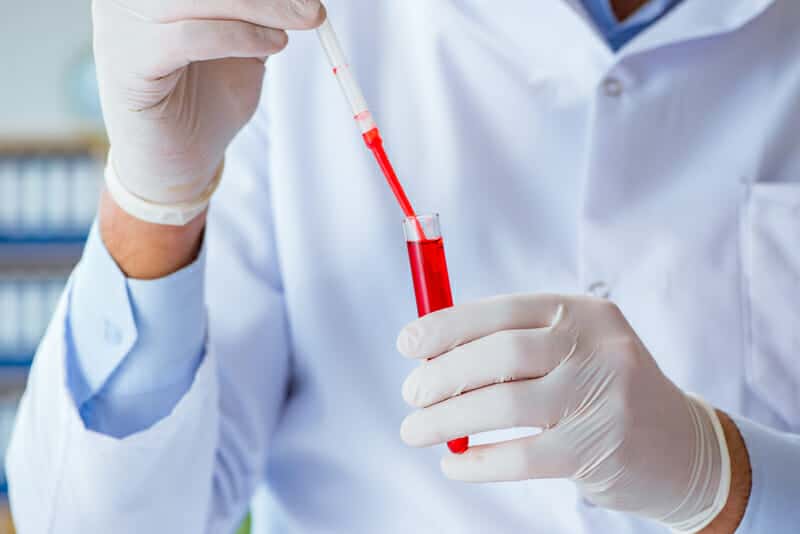
If you’re brand new here, allow me to catch you up to speed.
Reason #1: You MUST Set a Baseline From Which You Can Improve
How do you know if you’ve made improvements to your health if you don’t have a reference point to where you started?
As the old maxim from management consultant Peter Drucker goes:
What gets measured gets managed, and what gets managed gets improved.
The same is true of your health… while there are subjective things such as how you feel, there are objective data points that point to better health:
“To make meaningful changes to your health you must establish a set point. As a young man this means getting blood work done once a year. The reason to get regular blood work done is twofold.
First, it’s to anticipate any issues that may arise in the future. So you’re not blindsided, living a life of abject misery brought on by low T. Secondly, this data will present a case to your doctor in the future should you need to go on TOT.
Many doctors are dismissive of young men undergoing TOT due to their age. But who can deny a smart man who’s done his homework? Finally, this is simply good practice. It’s fundamental to take ownership of your health and not rely on anyone else.”
How else can you know if you truly have low testosterone levels or not?
Or if you are systemically inflamed?
Reason #2: You Get A Complete Picture Of Your Health
Notice I didn’t say “get blood work done once and you’re good”… I said REGULAR blood work!
Blood work must be done consistently over time in order to reveal if your health is headed in the right direction:
“For men in their 20’s and 30’s undergoing TOT, we recommend you get your blood drawn at least once a year. For those of you in your 40’s and up, twice a year is best. Additionally, an Anti-Aging Panel is highly recommended for anybody ages 35 and up.
If you are not already doing so, you should begin getting regular blood work done so you can compile and reference all your blood panel data for life. Having a detailed timeline of your first blood testosterone panel will provide excellent comparison points as your biomarkers change over time, which they inevitably will as you age”
I’ve been preaching this since 2016, back when I was equally knowledgeable but far less recognized in the fitness industry:
But make no mistake about it: Blood tests are what have allowed me to judge how well Golden Age agents work for me, keep my risk factors for age-related diseases low, and confirm my body is working as optimally as possible.
They have been a staple of my health regimen since 1999 when I first started using therapeutic testosterone and I still keep them as a reference.
With a complete picture of my health, I can take proactive control of my health instead of reacting to a problem when it’s already too late to do something about it.
Which leads me to the next point…
Reason #3: You Detect Health Problems Much Sooner and Solve Them Much Faster
Let’s say you’re suffering from a nutritional or vitamin deficiency that’s seriously ruining your health.
Perhaps your nonstop twitches and cramps are tied to your low magnesium levels… or your depleted iron levels are connected to your cold hands and feet.
That’s where regular blood work can come to the rescue:
But blood tests don’t just stop there.
They continue to be the gold standard for many purposes, such as:
- Early detection of cancer in otherwise healthy people
- Assessing organ function
- Evaluating the effectiveness of medications you are taking
- Determine your likelihood of contracting certain diseases at a later time
Even the state of your heart health can be revealed through several key biomarkers:
In the same way numbers don’t lie about reality, your blood doesn’t lie about your health.
You’re either on your way towards better health or on the fast track towards being buried six feet under.
The COVID-19 Pandemic Has Made Blood Tests More Important Than Ever
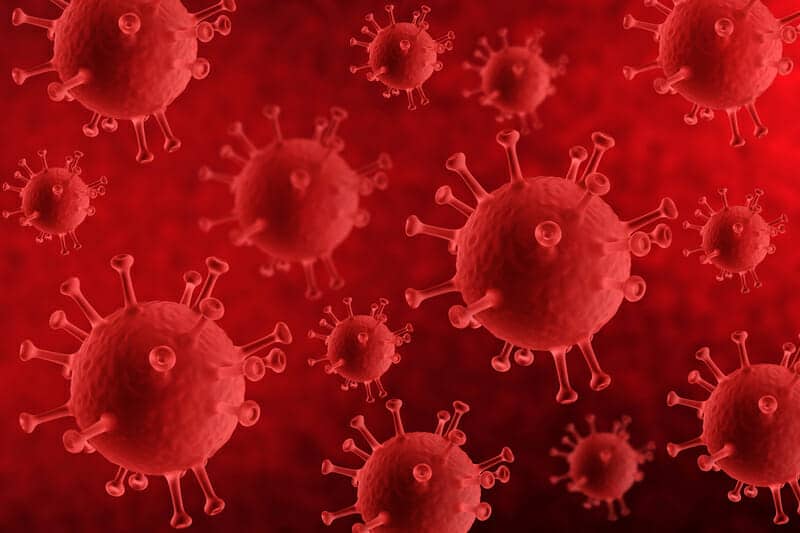
Let’s dive deeper into the importance of blood tests by looking at your testosterone levels in relation to the ongoing COVID-19 pandemic.
For many years, I have been screaming to the rooftops about how testosterone deficiency is an unrecognized global epidemic:
But thanks to what humanity has collectively experienced in the past 2 years, we are no longer in a testosterone pandemic or an endemic… we are in a testosterone catastrophe.
I highly recommend you read my recent article on the connection between testosterone and immunity to understand why the “male sex hormone” is the key to priming yourself against COVID-19’s nasty effects.
In short, low testosterone levels put you at far greater risk for a worse outcome from the disease itself.
Delight Medical does a great job of summarizing why this is the case:
“…getting the virus is not what is causing hospitalizations nor death. It is the Cytokine Storm that causes those problems.
Testosterone hormone’s main role in this disease process is that it suppresses the inflammatory markers and cytokines that produce the deadly Cytokine Storm.”
It is because of this role that TESTOSTERONE LEVELS in men contribute to the severity of this disease.
Men with higher testosterone levels were less apt to require hospitalizations after being infected with the virus, and conversely most the men that suffered the extremes COVID-19 were found to have hypogonadism or have lower than necessary testosterone levels.”
On top of having naturally high testosterone levels, exogenous testosterone itself may be a potential therapeutic solution:
“Several studies show that the proinflammatory state that arises due to low testosterone can be suppressed with the provision of exogenous testosterone… Evidence also suggests that testosterone therapy may confer a certain advantage over corticosteroids by blunting the inflammatory response to SARS-CoV-2, but without hindering the cellular immune response to the virus, as might be the case with steroid use.”
“The use of testosterone in patients with chronic obstructive pulmonary disease (COPD) provides a useful analog in which to investigate it’s potential therapeutic role. Importantly, men with COPD have worse outcomes when infected with SARS-CoV-2.
Studies indicate that testosterone replacement enhances lung function in middle-aged and elderly men with COPD, slowing disease progression and reducing hospitalizations compared to men with COPD not treated with testosterone replacement therapy.
Low testosterone levels reduce respiratory muscle activity and exercise capacity,54 while normal testosterone levels show a protective effect on various respiratory parameters, such as forced expiratory volume and forced vital capacity”
What I didn’t mention was the flipside — it may also be the case that COVID-19 itself is lowering men’s testosterone levels:
“Testosterone does play a role in protecting men from disease… However, it’s also possible that the virus itself is able to induce an acute reduction in testosterone levels, which then predisposes these men to a worse outcome. We’re now following up these patients over a longer time period, to see how their hormone levels change over time, so we can try and answer these questions.”
This finding was confirmed in a study published in August 2021 where the testosterone levels of 121 men were measured when they were admitted to the hospital, and the levels were again measured after 7 months.
Here are the results of the study:
“Circulating total testosterone levels increased at 7‐month follow‐up compared to hospital admittance (p < 0.0001), while luteinizing hormone and 17β‐estradiol levels significantly decreased (all p ≤ 0.02).
Overall, total testosterone levels increased in 106 (87.6%) patients, but further decreased in 12 (9.9%) patients at follow‐up, where a total testosterone level suggestive for hypogonadism was still observed in 66 (55%) patients.
Baseline Charlson Comorbidity Index score was independently associated with total testosterone levels at 7‐month follow‐up, after adjusting for age, BMI, and IL‐6 at hospital admittance [i.e. having more and/or worse comorbidities made it less likely your testosterone levels would recover over time]”
In other words, contracting COVID-19 can lower your testosterone levels, and if you’re unlucky enough you’ll find your testosterone levels decreasing long after you recover.
(Obviously, these men would have fared much better with testosterone optimization therapy and/or early at-home treatment protocols… but I digress)
But what we now know is the most dangerous part of the virus is the spike protein itself:
“…Another paper reported that the spike protein shares antigenic epitopes with human molecular chaperons resulting in autoimmunity against endothelial cells. In fact, the spike protein by itself (without being part of the coronavirus) was shown to damage endothelium in an animal model via impaired mitochondrial function.
A fourth paper reported that the spike protein could alter barrier function in an invitro model of the blood-brain barrier (BBB); in particular, the S1 protein promoted loss of barrier ability in an advanced 3D microfluidic model of the human BBB.
Finally, S1 protein was reported to actually cross the BBB and enter the brain of mice (20), possibly leading to neuroinflammation. In fact, another recent study reported blood vessel damage and inflammation, but no infection, in brains of patients with COVID-19″
Emerging research is starting to show the spike protein can damage your health in multiple ways, according to findings presented at a recent scientific conference:
“‘Our findings show that the SARS-CoV2 spike protein causes lung injury even without the presence of intact virus,’ Pavel Solopoy, a research assistant professor at the Frank Reidy Research Center for Bioelectrics at Old Dominion University said. ‘This previously unknown mechanism could cause symptoms before substantial viral replication occurs.’
For the study, investigators injected genetically modified mice with a segment of the SARS-CoVC-2 spike protein, and another group of mice with saline. The team then analyzed the responses the mice had after 72 hours.
Findings from the study demonstrated that the mice who were injected with the spike protein developed symptoms associated with COVID-19, including severe inflammation, an influx of white blood cells into their lungs and evidence of a cytokine storm. The mice who only received the sale shot remained normal.”
Coupled with potential damage to aquatic wildlife and you have a seriously powerful molecule designed to wreak havoc on human health!
The damage to the endothelium is the proposed mechanism through which researchers believe there could be a link between COVID-19 and erectile dysfunction (ED):
“It has been proposed that the effects of COVID-19 on the cardiovascular system (i.e., acute cardiac injury, myocarditis) and central nervous system lead to decreased blood supply to the genitalia which can lead to ED. Vascular integrity is also necessary for erectile function and endothelial dysfunction associated with COVID-19 is likely to affect the fragile vascular bed of the penis, resulting in impaired erectile function.”
(It’s also plausible that people more susceptible to COVID-19 may be unhealthier and suffer from some form of ED anyways)
Substack writer Joomi Kim has a phenomenal series on the production of spike protein through the virus compared to the vaccines — Part 1, Part 2, Part 3 — you should read to understand just what happens to this molecule in the body.
But to make a long story short, we have ZERO CLUE what the long-term effects of the vaccines are going to be on your testosterone levels.
Exactly how much spike protein is produced and all the places it may be located are still unknown
I’ve heard several anecdotal stories of men whose levels dropped shortly after and could not get them back up to their prior highs, yet we’re going to need long-term studies in order to assess what’s really going on.
The type of studies we should have done before forcing these experimental products into billions of human beings… but I digress.
If you’re not actively measuring your testosterone levels right now, you are doing yourself a dis-service both now and in the immediate future.
So where should you be going?
Who can you trust?
Private MD Labs: My Officially Endorsed Source For Comprehensive Blood Testing
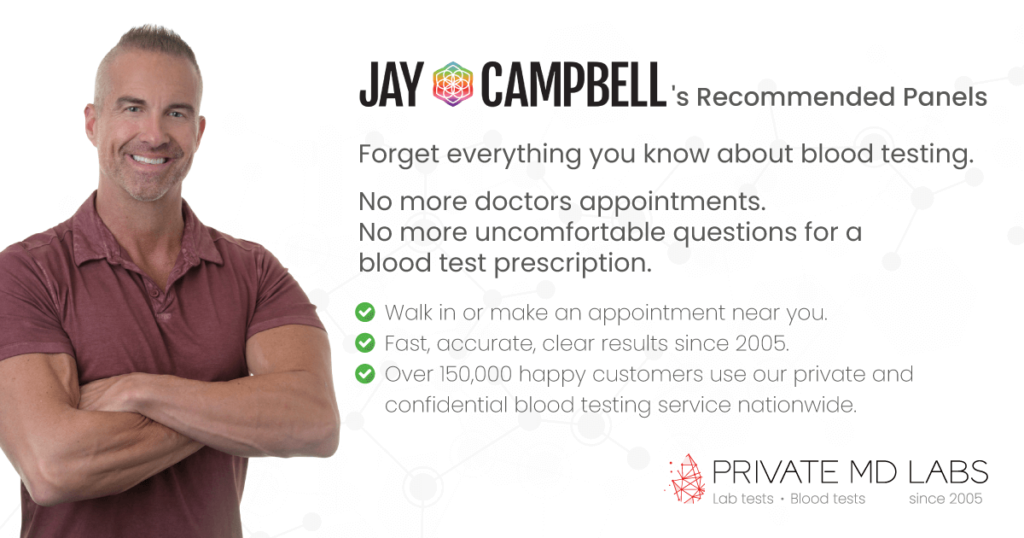
As of today, I’m proud to announce a partnership with Private MD Labs as my #1 recommended stop for all of your medical laboratory testing needs.
I have been using them independently since 2007 and they have been in business since 2005, served well over 150,000 customers, and have by far the most extensive coverage across the United States of America.
They offer more tests than any other company, provide diagnostic packages covering everything from sexually transmitted diseases to environmental toxin detection, and strike the perfect balance between quality and affordability.
The process for ordering a blood test is easy, fast, safe, and confidential…
- You choose the tests you want to order, whether customized or one of the standardized panels offered by Private MD Labs.
- You select the date, time, and lab location where you want to do the test
- You make your payment online.
- You create a private account where your results will be uploaded
- You arrive at the testing site with the printout of your requisition for testing (the test takes no more than 10 minutes)
- After the test is done, your results are available online through your private account within a few days
Private MD Labs runs on the “patient-requested testing”model, which allows YOU — the individual — to get a blood test without a physician’s referral.
But there are two main reasons why I’ve waited until now to partner with Private MD Labs.
NEW: Significant website upgrades that make the experience far more user-friendly
Due to their focus on having the highest-quality blood lab test available, expanding their online presence and optimizing the online user experience was put on the backburner.
But it’s the year 2021 and they’ve adapted with the times…
The checkout process is streamlined and involves fewer steps:

Easier to see exactly where the nearest lab location is on Google Maps, and how many miles it is from your ZIP code:

Other major changes include the following:
- Complete rehauls of desktop and mobile website design for easier browsing
- Revamped workflows for effortless re-ordering of routine tests
- (SOON) The ability to text yourself the lab address and/or requisitions for your convenience
- (SOON) Requisitions will be emailed directly to you
- (SOON) Requisitions can be faxed directly to the lab responsible for drawing your blood
But there’s a second and more important reason why I’m partnering with Private MD Labs…
NEW: Ability to customize your own blood panel
This isn’t a new feature per see, but one I’ve been meaning to take advantage of for many years.
One that is heavily based on the comprehensive biomarker cheat sheet I drew up in Chapter 12 of The TOT Bible.
So I was beyond thrilled when they allowed me to create 3 tiers of what I consider to be the preferred “Jay Campbell Biomarker Blood Panels”:
One for every budget.

Basic:
- Testosterone, Free and Total
- Total: > 600 ng/dL
- Free: > 2% of Total
- CBC (Complete Blood Count), specifically Hemoglobin/Hematocrit
- Hemoglobin: < 20 g/ dL
- Hematocrit: < 52-54% blood volume
- Ensures you’re not producing an excess of red blood cells
- Homocysteine
- Between 4.4 and 10.8 μmol/L as too much is linked to a higher risk of cardiovascular disease
- Estradiol (Sensitive or Enhanced)
- 20-50 pg/mL to ensure proper hormonal balance
- Vitamin D, 25-Hydroxy
- > 70 ng/mL (or 175 nmol/L), essential for testosterone production
- C-Reactive Protein Quant (high sensitivity CRP preferred)
- < 3.0 mg/dL to ensure systemic inflammation isn’t taking place
- TSH (Thyroid Stimulating Hormone)
- < 2.5 units/mL, could hint at subclinical hyperthyroidism
- Comprehensive Metabolic Panel (CMP)
- Assesses metabolism, liver and kidney health
- Albumin, Albumin/Globulin Ratio (calculated), Alkaline Phosphatase, ALT, AST, BUN/Creatinine Ratio (calculated), Calcium, Carbon Dioxide, Chloride, Creatinine, Globulin (calculated), Glucose, Potassium, Sodium, Total Bilirubin, Total Protein, Urea Nitrogen
- Includes eGFR (Estimated glomerular filtration rate), which should be > 60 mL/min/1.73 m^2 to ensure kidneys can appropriately filter waste from your blood
- Lipid Panel
- HDL >40 mg/dL, indicative of good heart health
- DHEA-S
- Age 20-29: 280-640 mcg/dL
- Age 30-39: 120-520 mcg/dL
- Age 40-49: 95-530 mcg/dL
- Age 50-59: 70-310 mcg/dL
- Age 60-69: 42-290 mcg/dL
- Over 69: 28-179 mcg/dL
- Helps produce testosterone and estrogen
- Prostate Specific Antigen
- <4 ng/mL to ensure you’re not at risk for prostatic infection
- HbA1c
- < 36 mmol/mol, normal blood glucose levels for a non-diabetic person
Intermediate
- Testosterone, Free and Total
- CBC, specifically Hemoglobin/Hematocrit
- Sex Hormone Binding Globulin (SHBG)
- 10 to 57 nmol/L, Important market of insulin resistance
- Homocysteine
- Estradiol (Sensitive or Enhanced)
- Vitamin D, 25-Hydroxy
- Prolactin
- < 30 ng/dL, high readings linked to low sexual desire, erectile dysfunction, and gynecomastia
- C-Reactive Protein Quant (hs-CRP preferred)
- Full Thyroid Panel (Free T3, Free T4, TSH)
- Free T3 between 3.7 and 5.0 pg/mL
- Free T4 between 0.9 to 2.3 ng/dL
- Lower values indicate possible hyperthyroidism, higher values indicate possible hypothyroidism
- Comprehensive Metabolic Panel (CMP)
- Lipid Panel
- DHEA-S
- Prostate Specific Antigen in Serum
- HbA1c
- Pregnenolone
- 80-180 ng/dL for men, plays important role in cognitive function and aging
Advanced:
- Testosterone, Free and Total
- CBC, specifically Hemoglobin/Hematocrit
- Sex Hormone Binding Globulin (SHBG)
- Homocysteine
- Estradiol (Sensitive or Enhanced)
- Vitamin D, 25-Hydroxy
- Prolactin
- C-Reactive Protein Quant (hs-CRP preferred)
- Full Thyroid Panel (FT3, FT4, TSH)
- Comprehensive Metabolic Panel (CMP)
- Lipid Panel
- DHEA-S
- Prostate Specific Ag Serum
- HbA1c
- Pregnenolone
- LH and FSH
- Magnesium, Serum
- Between 1.7 to 2.2 mg/dL, maintains normal nerve and muscle function
- Iron, Serum with TIBC (total iron-binding capacity)
- 55-160 μg/dL, important for making red blood cells and for proper thyroid function
- Ferritin, Serum
- 55-270 ng/mL, an indirect measure of iron storage (you want these balanced to avoid excess/low
- Urinalysis Routine Profile
- The color, clarity, acidity, and many other factors can often act as signs of common age-related diseases
No stone is left unturned as I’ve thought of every last biomarker a man needs to assess once a year (or more).
Even with the Beginner-level panel, you receive a complete and comprehensive picture of your overall health.
How To Save Big With Private MD Labs
Thanks to Private MD Labs allowing me to become their partner, I can offer my loyal readers a HUGE discount on the custom “Jay Campbell” panels they created for me:
Use my affiliate link and get 15% off your order with code JayC
For newbies to blood testing, I recommend you start with my Basic panel.
It’s easier to begin with smaller steps and then work your way up towards having access to a larger volume of data.
Regular blood work has allowed me to measure and take full control of my health unlike anything I’ve ever used.
Wearable biotech gizmos will come and go, but it will be many years before they can outperform a comprehensive blood panel.
As always…
Raise Your Vibration To Optimize Your Love Creation!
PS – If you want a master rolodex of every single product, service, supplement, and software I’m using to achieve extraordinary levels of health, sign up for The Fully Optimized Health Private Membership Group.
In addition to full-on access to me, you’ll be able to reach new levels of physical and well-being with a group of high-conscious, like-minded men and women.
You’ll also get access to my best-selling books and webinars for free, state-of-the-art testosterone optimization, cutting-edge research on peptides and supplements, interviews with spiritual masters, and my “black book” Rolodex of the world’s best hormonal health physicians.
Until my TOT Decoded course launches on Dec 24th, you can get exclusive access to the group for only $49/mo.

